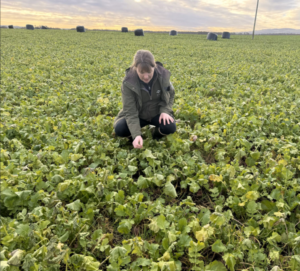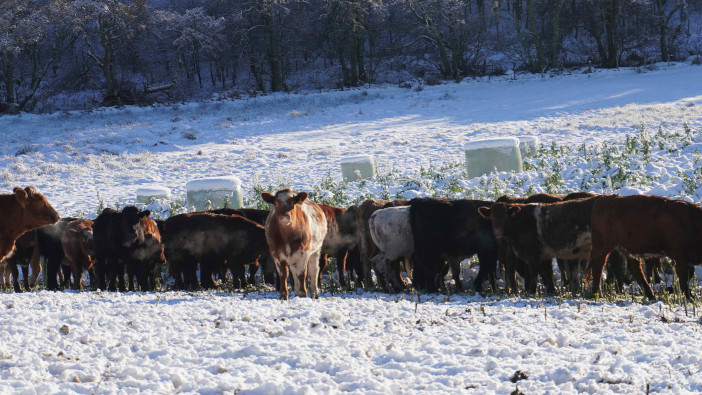With extremes in weather, livestock overwintering systems have been under pressure, with sowing delayed due to the cold, wet springs, and the mild winters forcing many to reassess their cropping.
Four farms from the Deeside Monitor Farm management group are now sharing their experiences. Facilitated by Kirsten Williams, SAC Consulting senior beef and sheep consultant, the project will look at managing and utilising wintering systems, with monitoring throughout the growing period, yield calculations, crop analysis and feed allocation.
The four farms involved are:
- Duncan and Claire Morrison, Meikle Maldron, Torphins – Monitor Farmers, who will be building on their outwintering experience through managing deferred and bale grazing as well as kale over winter for their cattle.
- Robert Marshall, Kincraigie Farms, Lumphanan – growing hybrid rape and a hybrid rape and yellow swede mix which will be grazed overwinter by his spring-calving cows and in-calf heifers, with baled silage sited in one field pre grazing.
- Jonny Stewart, Mains of Balfour, Rashenlochy Farm, Drumoak – growing fodder beet and swedes for outwintering sucker cows behind an electric fence, with an arable stubble backrun and hay.
- Alex Stephen, Inch of Arnhall, Edzell – a dairy and sheep farmer, Alex is growing fodder beet for ewes to reduce concentrate use pre-lambing, a forage brassica mix for grazing lambs, and stubble turnips for grazing in November onwards with dairy cross stirks.

Kirsten Williams said: “With the unpredictable climate, and different types and classes of soil in Scotland, not every producer can manage outwintering systems. The four farms we are following have various outwintering systems on different soil types, altitude, and classes of stock, with the main driver to use the land asset and reduce the cost of wintering, while maintaining high welfare and nutrition of the animals.
Kirsten added: “There is huge potential for outwintering systems for livestock in the North East. They offer numerous benefits in that they can reduce the cost of winter feeding and the requirement for housing and straw use, while enhancing the production per hectare from the farm and allowing for nutrient cycling from the animal to the soil. The unpredictable weather patterns do give the systems a challenge, meaning having a contingency plan and careful planning of the site.”
Peter Beattie, Monitor Farm regional adviser said: “These farmers have experience of outwintering and forage crops already, but this project will bring more detail and discussion to the topic. It will look at all of the pros and cons, and provide farmers across the North East with a good idea of what might be possible, practical and cost effective on their farms.”



